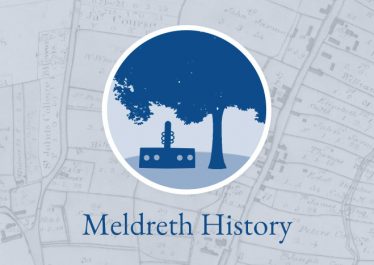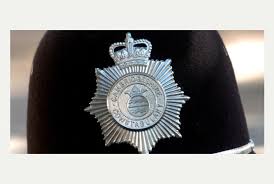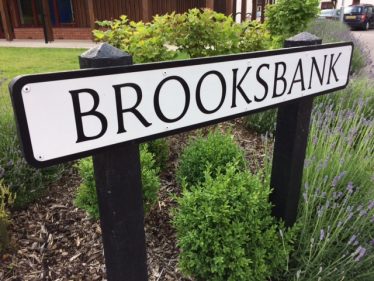Inspector Ron Brooksbank (Retired)

A transcription of this audio file can be found at the bottom of this page.





In former years, Meldreth was policed from Melbourn and Mr Ron Brooksbank was one of the last Sergeants to serve at the Police Station there before it was closed and later demolished to make way for the building of the Melbourn Hub and nearby housing. Born on 8th December 1924, he lived in Melbourn until his death in 2018. I interviewed him there in the summer of 2015 about his career in the Police Service.
Originating from Peterborough, he served in the Royal Air Force during the Second World War. While stationed at a nearby airbase he met his wife-to-be, Muriel, on a visit to the Midsummer Fair in Cambridge. She was in the Land Army during the War. They had been married for 68 years when she died in April 2015 and he says of her “we never had a row in all our married life”.
When he was demobbed at the end of the war, Ron went back to Peterborough and took up his old job as cold meat butcher. After a short time he moved to live in Harston where he met two brothers who worked in the Cambridge City Police (a separate force in those days from Cambridgeshire County Police). He was encouraged by them to join and sat the entrance examination when he was about 23. He was accepted and sent to training school for three months. On completion of his training his first posting was to the old Police Station in Cross Lane, Melbourn, under the direction of Sergeant Adams.
The Police Station adjoined the old Courthouse where sittings were held every fortnight. He remembers that Mr Vinter was Chairman of the Bench and a farmer named Mr Murfitt and a Mr Jack Wing were also JPs. There was little room in the courtroom for the public. His first case was an “old boy riding through the High Street with no lights.” He was fined 15 shillings and Ron says he felt sorry for him! There were four officers stationed at Melbourn and five ‘out stations’ in nearby villages such as Fowlmere, Bassingbourn, Steeple Morden and Orwell with a police constable living there. Ron describes the Cross Lane building as “dilapidated”. The Police Station covered many of the surrounding villages, Meldreth included. Police Constables worked an eight hour shift – four hours out on the beat, usually on their bicycles, on what was known as a ‘fixed tour of duty’ and the other four hours back at Melbourn, doing work at the Sergeant’s discretion. Out on the beat, Ron would call in at post office kiosks on a pre-arranged route and stay for fifteen minutes so the station could get hold of him if need be. He recalls that there wasn’t much crime to deal with: “in those early days there wasn’t a lot doing.”
After three or four months at Melbourn he was sent to Harston. There he carried out a variety of duties including road checks on the A10. One particular night at the “The Old English” pub (now an Indian restaurant), Ron and a colleague from Shelford came across two men who said their car had broken down. They were evidently Londoners and he “knew something was up because you didn’t get Londoners at 4 am in Harston”. They got the men and their car down to the Police Station and “before you could say Jack Robinson they’d assaulted us”. The men ran off in different directions, a dog handler was sent for and the police dog caught one of them as he tried to escape across the fields. £6,000 of stolen goods was found in the car, taken from shops in Cambridge. The men were eventually sentenced to three years apiece.
Shortly after this he was sent on a CID course at Wakefield in Yorkshire. He knew this would involve a move and subsequently he was posted to Girton. At that time the County Police had its headquarters on Castle Hill next door to Shire Hall in Cambridge. It was a small force with only about 100 officers covering the whole of Cambridgeshire. Over the next five years Ron Brooksbank worked as a Detective Constable in the CID and was then promoted to the rank of Sergeant and posted to Melbourn, the biggest section in the force at the time. On his return to Melbourn he and his wife moved to live at the new police station on the High Street in Melbourn, built in 1956.
He enjoyed his new posting and recalls that he had “a wonderful Parish Council” whose Chairman and Secretary came to see him every month and with whom he built a very strong relationship. Three Police Constables were based at Melbourn with him; all had their own police houses. They handled most of the crime locally – “you name it we used to deal with it” – but if serious offences occurred the CID was brought in. A number of busy roads passed nearby – the A10, A505 and A14 – and he remembers being called to deal with many accidents, including several at Flint Cross, then, as now, a traffic black-spot.
As Sergeant he had a Vauxhall Wyvern which was not provided by the Force – he had to buy it himself, though he did receive a motoring allowance. He recalls that there were eventually three cars at Melbourn and that the ‘specials’ (Special Constables) “loved going out in a car with their flat hats on”. The Melbourn police had Panda cars, too, which he describes as “absolutely marvellous – but we tried to double-crew them as often as we could so people didn’t manhandle you.” They covered quite a wide area from Melbourn, including Meldreth. A lot of it was farming country and Ron says that there wasn’t much serious crime – one or two big houses broken into but typically, perhaps, “someone had pinched two or three bags of spuds or some farm equipment or taken tyres off a tractor.” He doesn’t recall any notable cases from Meldreth and says that they were “good, quiet people there.” There was, though, an Approved School at Kneesworth, run by a Mr Brooks and taking juvenile offenders from all over the country some of whom re-offended in the local area: “they were little b******, they were!” says Ron.
His approach to the job was to make policemen as visible as possible in the community: “we always had someone about.” He was very well known to local people and many went to him if they were in any trouble. They referred to him as “the Sergeant” and to his wife, Muriel, as “the Sergeant’s wife.” Sometimes a woman who had experienced violence at the hands of her husband or boyfriend would come round to their police house and Muriel would give them shelter. He says he hardly ever experienced any problems with young people; he would laugh and joke with them as they waited to catch the school bus in the morning. He remembers that one of his police colleagues owned an Alsatian dog. Ron used to look after it while he was away and would sometimes take the dog down the High Street when he went out on patrol. It wasn’t a trained police dog “but people didn’t know that!” He adds that “I’d have been shot if they’d caught me.”
One of the incidents that stands out most clearly in his memory was when a Canberra aircraft crashed on a house at Steeple Morden. The house was empty at the time and no one on the ground was killed but the three members of the aircrew all lost their lives. Ron says that, having been in the RAF himself, he felt a special affinity with them and wanted to see that everything was done properly in the aftermath of the crash and the investigation that followed. He gave two of his officers free rein to do whatever was needed. The Coroner was very complimentary about the help he had been given by the Melbourn police though Ron says that, to his dismay, he was later told by a senior officer that too much police time had been spent. He could not have disagreed more.
Ron says that he did have to get rid of one officer during his time at Melbourn but he was the only one with whom he had any trouble; otherwise his was a very good team. Ron looks back fondly on his years as a Sergeant and says it was “marvellous working there”. The Inspectorate of Constabulary paid him an annual visit and the Chief Constable, then Donald Arnold, also came once or twice a year but there were only a few meetings to attend at police headquarters, very few statistics to compile, no targets for clear-up rates and much less paperwork than would be the case today. He recalls the Police Ball which he instituted as a tremendous success – two bands, excellent food and very popular in the local area where many people regarded it as “the function of the year”; tickets were always in great demand. He thinks he “must have done a few things right” because years later he was approached by the Council to say they were planning to name a Melbourn street after him – Brooksbank, next to the Hub and where the Police Station once stood. He was taken aback at the idea at first but thought it “quite an honour.”
Then, one day, he had a telephone call at home telling him to go to the Chief’s office at ten o’clock the following morning. The Chief Constable (by then Frederick Porter, “a smashing fella”) came round from behind his desk, shook Ron by the hand, congratulated him and said that he had been made an Inspector. He was at, at the time, the oldest Inspector in the Force. He returned to work in Cambridge and was given charge of the Patrol Group – the “hard boys”, as he describes them, who dealt with any public disorder. It was “our job to be there before it started,” Ron says. In the last job he had before he retired he was based at Parkside divisional headquarters in Cambridge. On his final day at work in 1979 he was in charge of the November 11th Remembrance Day parade at the city’s War Memorial. Afterwards, as he walked back down Emmanuel Street, an elderly man crossed over from the other side of the road to speak to him: “I’d just like to say that you’re the smartest policeman I’ve seen for years”. Ron says that he was “thrilled to bits” and replied “You’ve made my day – in two hours time I’ll be Mr Brooksbank.”
Ron Brooksbank died on 18th June 2018. He was 93 years old.
Ron Brooksbank’s memory of the day he retired
‘This is the real truth this is. It was on November 11 when I retired and I done the parade at the Railway Station, or near the Railway Station you know, the memorial, isn’t it, at the bottom of Station Road. I trooped down to the Police Station, parked the car and walked down the road to Emmanuel Street minding my own business. There was another gentleman over the other side of the road, an elderly gentleman, not a young chap. Suddenly he started coming across the road and he said “I’d just like to say” he said, “you’re the smartest policeman I’ve seen for years”. I said “You’ve made my day, I said, in two hours time I will be Mr Brown or whatever” and I said “Thank you very much.”
Do you know what, that thrilled me to bits and here I am near ninety, look.’
Click on the audio link at the top of the page to hear Ron talking about his days in the Police.





Comments about this page
I remember Sergeant Brookbank and the local bobbies. They were all good and would stop and talk to you. But, I wonder if the Sergeant remembered coming to Dolphin Lane on the occasion of our Polish lodger having a gun and causing trouble? I would have been around 12 yrs old so this would have been 1958. The lodger was taken away and never seen again.
Add a comment about this page